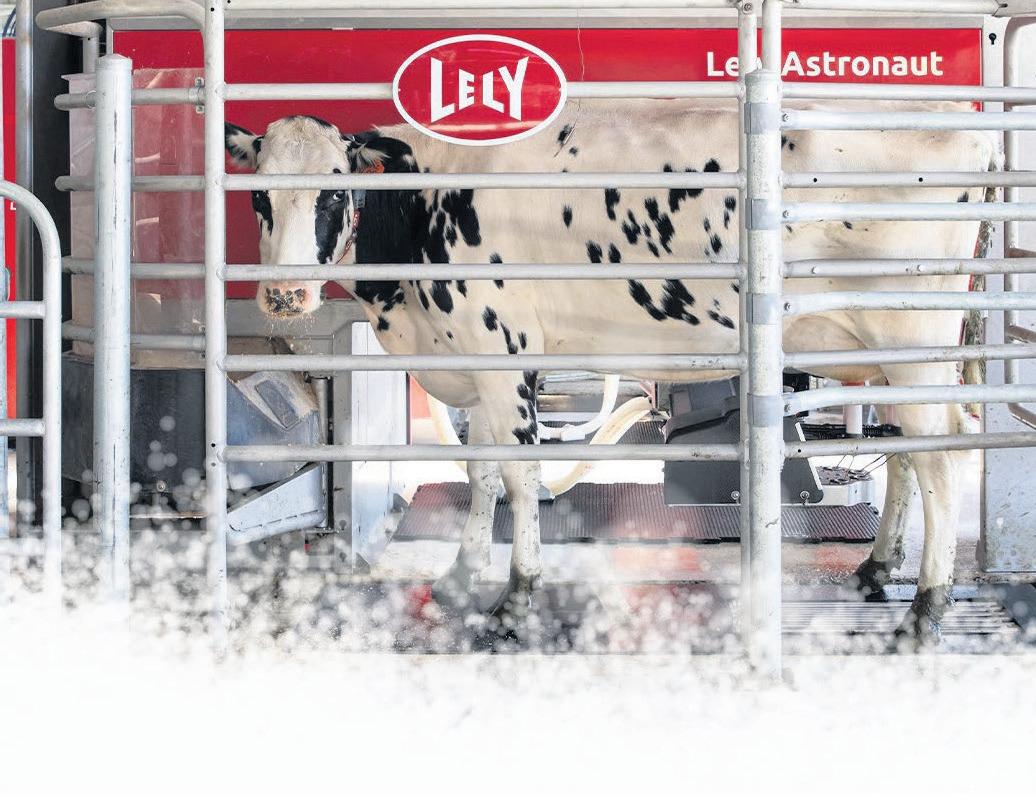


































WHAT A wacky weather year we are having.
Sitting in my lounge room with the fire roaring in the middle of November, one could well imagine a white Christmas for this corner of the Southern Hemisphere might well be on the horizon.
Best laid plans for spring harvest and summer crop planting are under daily review, with the various weather apps in constant use and the daily schedule constantly adjusted — it truly has been a year to test our flexibility.
While the south-west has certainly experienced one of our highest rainfall years on record, we are all critically aware of the dire situation of farmers and their communities to the north of us as they continue to battle record-breaking floods. Let’s hope things improve soon.
There have been some areas of the southwest more significantly affected than others by flooding, which may be eligible for recovery assistance via the Victorian Special Disaster Grants – Primary Producer Flood Recovery Grants being administered by Rural Finance.
Should you need any help in completing the paperwork, the Rural Financial Counselling Service is always a good place to start.
Their staff have been briefed by Rural Finance on how to help people apply for these grants, so they are the best source of help. The free-call number is 1300 735 578.
Due to the unusually wet conditions, the Fert$mart workshops previously planned for spring have been rescheduled for late January. Keep an eye out for new dates as they are released. Or contact the WestVic office at any time to register your interest on 5557 1000.
Since my last report, the WestVic Dairy board has held its AGM, which was both in-person and live-streamed via our Facebook page.
Hybrid events may well become the norm post-pandemic as the capacity to involve and reach more people is an obvious improvement to how we can communicate.
You will find a copy of the annual report on the Dairy Australia website, or if you would like a hard copy it can be mailed to you on request to the office.
Timboon P-12 School has been successful in its application to the Secondary Schools Agriculture Fund to integrate even more STEM learning objectives into its curriculum to inspire the next generation of farmers and today’s fledgling engineers.
The Timboon project will expand on the current Timboon Agriculture Project curriculum-based applied learning opportunities and will provide a platform for the development of a new Year 9 and 10 AgHort Connections elective combining STEM, commerce and humanities to showcase to students, teachers and the community the diverse range of rewarding career opportunities in agriculture.
The school has received $56,000, which will be used to create even more real and relevant curriculum and engagement opportunities for all students, especially in the Year 9 and 10 AgHort cohort.
During immersion, field trips, workplace tours and incursions, students will learn about the myriad of careers across paddock-to-plate pathways and that there are many ways to contribute to help feed the world.
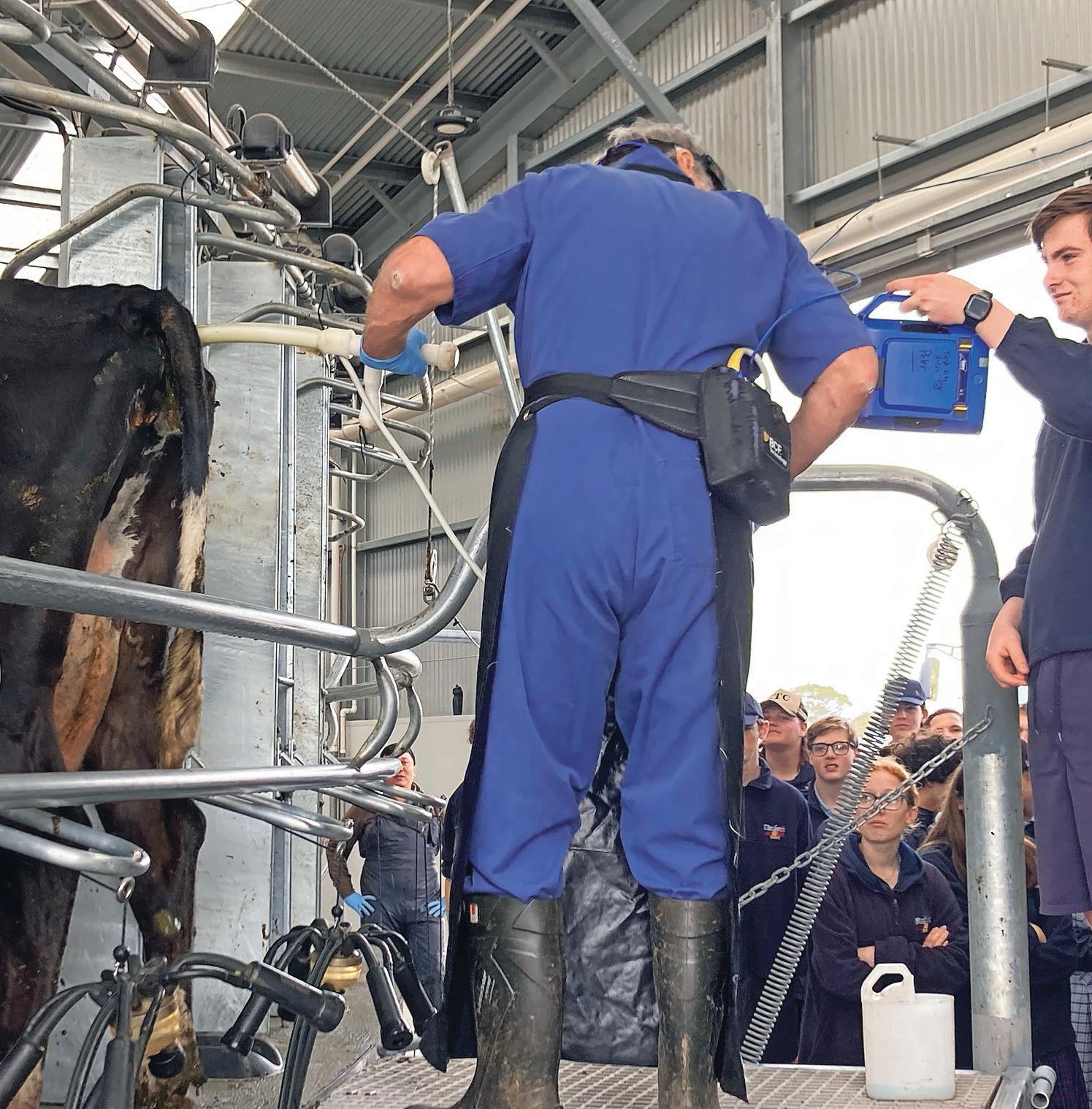
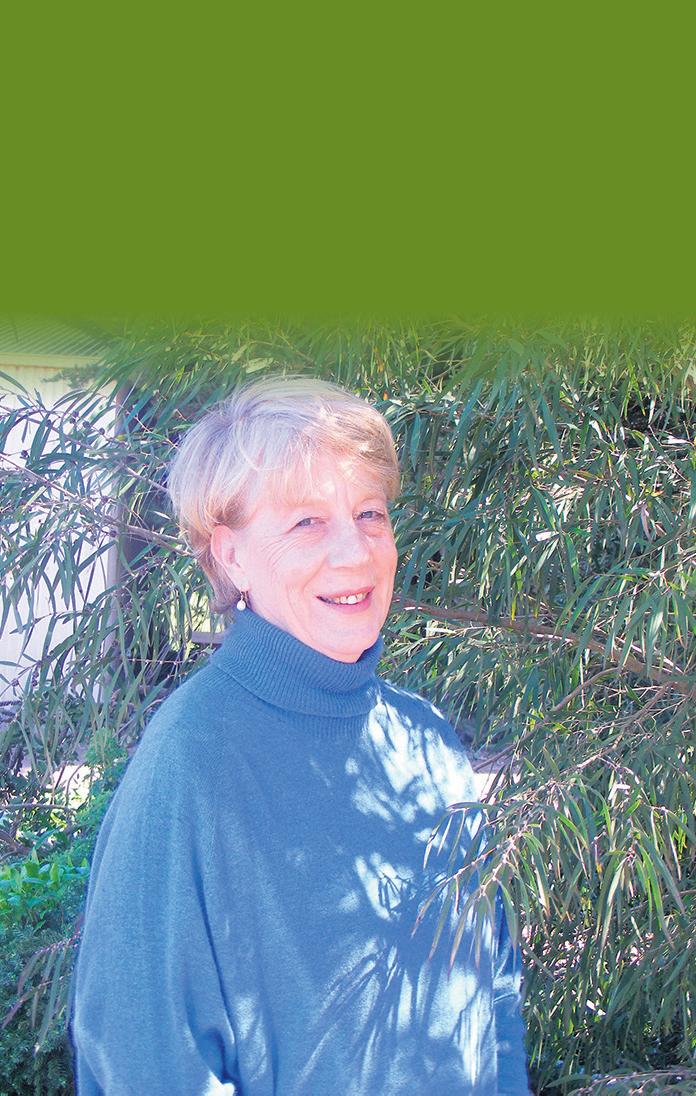
A farmbot robotic open hardware system will be purchased to enable students to work in a small garden growing food with capacity to weed, water and soil test, with students refining their coding skills to generate tasks.
Other tools like 3D printers and drones to provide spatial and data-based analytics, a greenhouse to conduct experiments and other engagement tools will be utilised.
This project will continue to share the work of the Timboon Agriculture Project, facilitating an applied learning approach in the Prep to Year 12 classrooms, linking the curriculum with tasks and activities associated with specific occupations and industries and keep contributing to strategic planning and program development in industry, community and education partnerships.
For more information, visit: vic.gov.au/ secondary-schools-agriculture-fund
The WestVic board bid farewell to Dan Parkinson and Bryan Dixon, who had both completed their terms — with much regret but sincere appreciation for their time and contributions.
We also welcomed two new board members — Brooke Lane (see her profile on page 3) and Lucy Collins.
As we look forward with a refreshed board team, a key focus over coming months will be the development of our next strategic plan.
It is of critical concern to the board that we plan and deliver on the needs of our region, using the considerable skills of the WestVic staffing team to support you all on your farming journey.
Various opportunities to provide suggestions, recommendations and feedback will be facilitated over coming months, and the board really welcomes your active participation in this preparation phase of our future strategy.
As we look towards Christmas, take care in the hustle and bustle of the festive season and enjoy some special times with your loved ones.
Jacqueline Suares WestVic Dairy chair BY RICK BAYNE
BY RICK BAYNE
AT 27, WestVic Dairy’s newest and youngest board member Brooke Lane wants to encourage more young people to look at a career in the dairy industry.
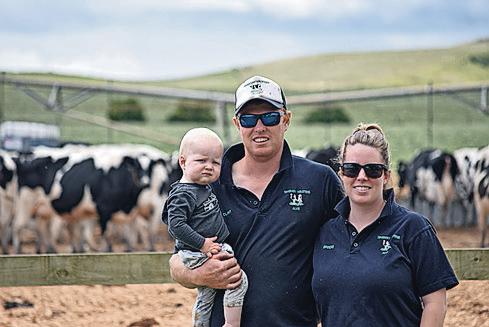
Brooke has experienced first-hand the stigma that can be attached to the industry and she’s determined to play a part in repositioning dairy as a career of choice.
But not everyone agreed with her move into the industry.
When she was in Year 10, Brooke wanted to do a dairy apprenticeship, but her mother was having nothing of it, even though they lived on a hobby farm just 800 metres from her current dairy farm.
“She didn’t want her daughter to become a dairy farmer, but I proved her wrong a few years later,” Brooke said.
After working in an office for a year after finishing Year 12, Brooke got the chance to enter the dairy industry with her partner Clint Theodore and she hasn’t regretted the move.
“It’s a great lifestyle, even though my mother still complains that I work too much,” she laughed.
Brooke has been on the Alvie farm near Colac for nine years; Clint had arrived two years earlier as farm manager.
They bought 220 cows from the existing herd and went 50:50 sharefarming in 2014. They built the herd up to 300 cows over the next five years and went into a lease in 2019 for the 172-hectare farm.
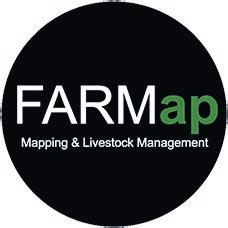
The fully registered Friesian herd has grown to nearly 400, and they are also developing a purebred Speckle Park beef herd.
“I started cross-breeding for beef about five

years ago and got more serious about it in the past three years,” Brooke said.
“It’s a good side interest and good for diversification of income.





“It’s part of a long-term plan, potentially a retirement fund rather than investing in super. It takes a long time to build up a purebred herd.”
Brooke and Clint are happy with their leasing arrangement with three farm owner investors.
Traditionally the land near Lake Corangamite was used for dairy but it was very rundown when purchased.




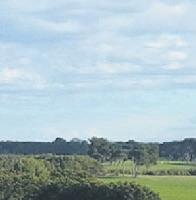

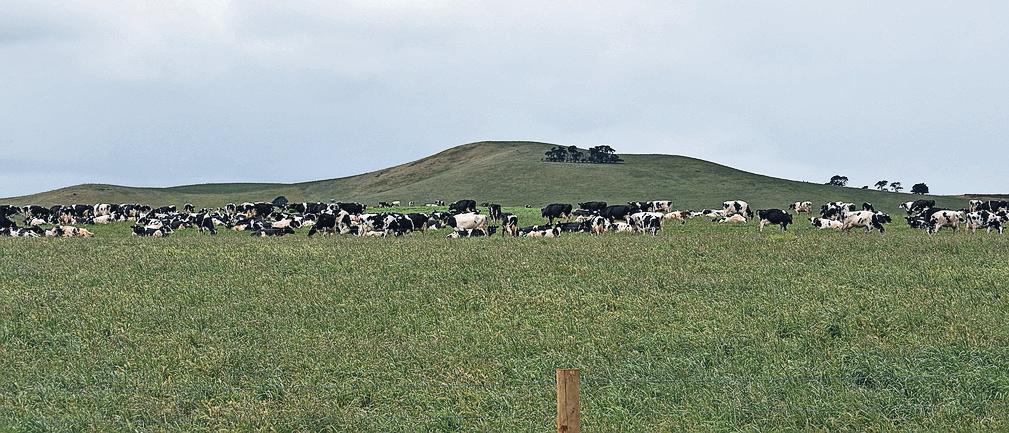
After the new owners and Clint came in, the old dairy was stripped and new laneways, fences and centre pivots added along with an emphasis on making the farm clean and functional.
The current 20-a-side swingover dairy will soon be updated to a 20 double-up.
“It’s very worn down,” Brooke said.
“It was put together from second-hand pieces and it’s far too slow — milking takes close to three-and-a-half to four hours twice a day.”
Luckily, the farm has four full-time staff — two permanents and two backpackers until January 2 — and Brooke already has interest in filling those positions.
“We did long hours and did everything ourselves for seven to eight years and then once we started having kids, we realised there’s more to life,” she said.
The land is volcanic, free-draining soil that is rich in nutrients and doesn’t need much maintenance.

It is a 100 per cent grass-based operation with no summer cropping. They lease some land to a local potato grower as part of paddock rotations.




“We did it last year and again this year,” Brooke said.
“It’s a handy cash flow. If we put in another product, it wouldn’t really add to our business or our feed base and we use paddocks that need renovating. It’s a win-win for both parties.”
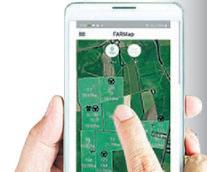
The cows produce about 11,000 litres on average and 700 to 710 kg/MS.
“They’re really big cows, well-bred and wellfed. I’m really happy with where we have been able to get them,” Brooke said.
“When we purchased the herd, they were like big giraffes, not pretty to look at, they had big udders but produced a lot of water and they could not get in-calf.”
Brooke and Clint embarked on a new breeding program.
“We put in collars in January 2016 and started breeding for fertility and a slightly smaller stature.
“They’re still big cows, but they’re not giraffes and they have more sustainable udders.
“The main issue was fertility and we’ve addressed that problem with the collars, using sexed semen with heifers and through good bull selection.”
Brooke, who had been working with the Fonterra Australian Suppliers Council for nearly three years, was hesitant to apply for
the WestVic Dairy role but was encouraged by some colleagues.
“I hope I can contribute a different critical layer of thinking,” she said.
“I think before I say things and analyse the situation before I contribute.”
Brooke hopes her elevation to industry representation at a relatively young age will inspire others.
“I’m really passionate about getting young people from schools or other careers into the industry.

“There are massive opportunities and it’s important to get education out there, particularly into schools.
“I think the industry really lacks in attracting young people and I hope I can help with that.”
Brooke wants to overcome stigma connected to dairy.
“We need to promote awareness of what the industry can do for your career and the lifestyle it can provide.
“People don’t have to have the finance to buy into a farm — they could have a great career and end up in a good financial position from being a farm manager or in many other jobs.
“There’s still a taboo around being a farm hand but there’s no farms without farm hands. We’ve got to get rid of that stigma.”
Brooke believes the lack of young, aspirational people coming into the industry is the major threat to its future, but she still has a positive outlook.
“Dairy is an important food source and there’s still going to be demand, so I don’t see a massive downtrend.
“But getting the right people with the right agendas into the right roles in industry leadership is critical to reflect what farmers want on the ground.
“Unless you’re out there in the gumboots and overalls, you’re not going to know.”
BEC TOLEMAN has never lived on a farm, but she’s probably milked cows on more southwest Victorian dairy farms than anyone.
The South West TAFE agriculture teacher also plays a big role in shaping current and future workforces on local dairy farms.
For Bec, helping the industry and young people to find their way in life is a passion that continues to burn.
The 2022 Teacher/Trainer of the Year at the Victorian Training Awards stumbled into agriculture and really found her niche in dairy.
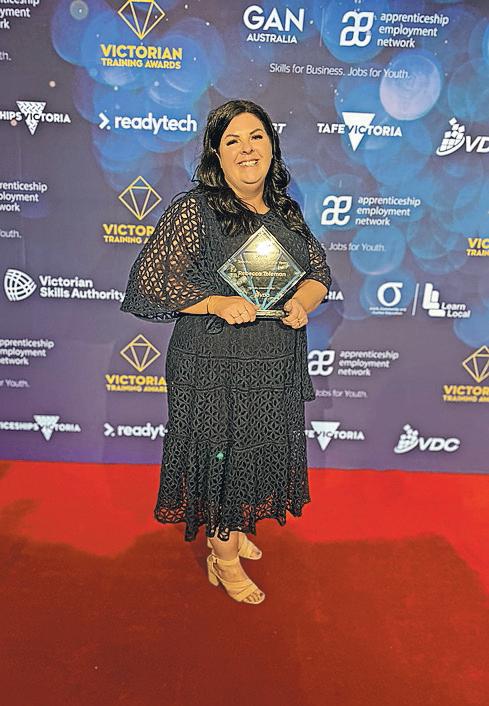
Raised on a hobby farm at Hawkesdale, Bec had been a pharmacy trainee before starting her family of three.
She was in and out of short-term jobs between raising her children, but a dairy connection opened life-changing opportunities.
About 14 years ago, Bec and her husband Daniel McKenna started a dairy cleaning business, Under Pressure Dairy Hygiene.
“We saw there was a need for a specialist around bactos and thermos in the milk line and making sure farmers can provide top quality milk to the factories,” she said.
“We had friends on dairy farms and saw patterns of how they’d have bad readings, so we researched it and imported a cleaning machine and started the business to help farmers correct the problem.”
One of Daniel’s dairy farming friends at Grassmere was desperate for a milker on their Herringbone 28-a-side swingover.
Bec was an instant convert.
“I got shit on me the first time but I could see how maternal, smart and gentle cows are,” she said.
“I started milking on weekends and then the farmer asked if I could do more so I started raising calves and really loved that.”
The farm wasn’t doing well but Bec did her bit to help.
“It was around 2010 when things were really tight.
“I hand-raised 68 calves that were sent to export that made them some money, which was really good for them at the time.
“They offered me an opportunity to do a traineeship so I did a Certificate III in Agriculture with a mindset that I was going to go into genetics as I loved the whole breeding side of things.”
Bec completed her artificial insemination ticket and was offered a position with an AI company. At the same time her traineeship host, RIST, offered her a role as a dairy coordinator.
“I had to weigh up if I wanted to juggle kids getting up early in the morning to do AI or move into working and supporting young people.”
She chose the second option and her world was about to change.
Bec worked in that role for about four-anda-half years, looking after dairy students across the south-west.
“Over that time, I probably milked in 50 dairies with different students,” she said.
Bec never lived on a farm but thinks she has the best of both worlds.
“I can be part of this amazing industry but then go home to bed knowing I’ve got a regular wage.”
Bec also completed a Certificate IV in Agriculture and Training and Assessment so she could correct work and visually assess students on farm.
“I enjoyed mentoring and supporting young people. I saw people come from different walks of life who probably wouldn’t have had opportunities without this.
“I decided I was going to be the make or break for them. I was blessed to see some kids achieve things they had never done before and to watch them flourish.”
After 4.5 years she needed a change so went roustabouting in shearing sheds for 18 months but soon realised her heart was in dairy.
She moved into teaching at South West TAFE, which offers Certificates II, III and IV in Agriculture and is the only registered training organisation to teach a Certificate III in Dairy Production.
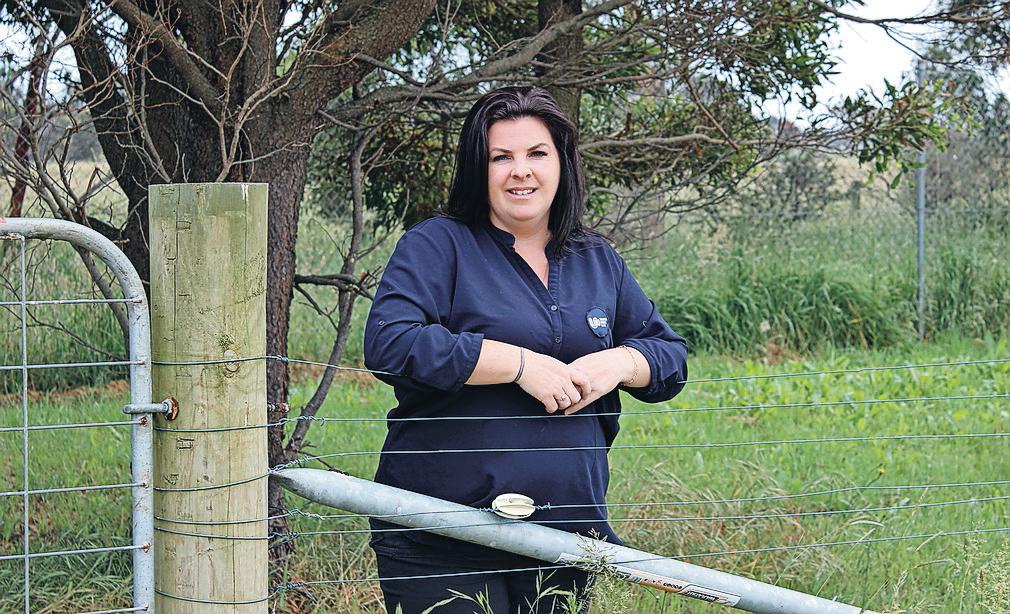

Two years ago, Bec started a VET schoolbased program introducing mostly town-based students to agriculture.
Instead of having to be employed on a local farm for a traineeship, the Year 10 to 12 students come to TAFE’s Sherwood Park and Hamilton campuses for training in agriculture.
“It’s important that people outside the industry have the opportunity to be part of it,” Bec said.
“Kids in the city could be the next amazing vet, agronomist or farm worker.”
The course attracted 15 students last year which grew to 30 this year, with more than 40 wanting to enrol in 2023.
“We hope to address staffing shortages and introduce kids to agriculture as a whole,” Bec said.
“The whole idea is getting townies involved. Out of the 30 this year, only seven were off a farm.”
The course also appeals to girls, with 25 of this year’s cohort being female.
Bec has found employment for several students and she’s taking dairy to the community, with visits to local schools showing a birthing simulator cow imported from Canada.
“It’s important that South West TAFE is out on farms and out in the schools and supporting agricultural industries,” she said.
“We’re in the heart of the dairy industry here, so why aren’t we planting the seed early?”
Bec is upbeat about the future of dairy, and her two eldest daughters are pursuing study in agriculture.
She said having good workers was vitally important, and was happy to keep playing a role in developing new talent.
“You need someone ready to learn who is keen and passionate.
“You can come from any walk of life and there’s always some part of agriculture that you’ll fall in love with.”
She appreciates the state recognition for her teaching, but shows modesty typical of a farmer.
“I don’t think I’m any different to anyone else, but I am willing to go the extra mile for my students.
“I’ve just helped students who are passionate about showing cows to register their animals and took my swag to the Camperdown Show, helped them unload and prepare the cows and was on poo duty overnight.”
Daniel has been battling stage four cancer for the past three years so the dairy cleaning business has taken a back seat, though he is currently in remission and working when he can.
Bec has taken on a cleaning contract at a local primary school, working five nights a week in addition to her full-time TAFE job, but that hasn’t quelled her enthusiasm for agriculture.
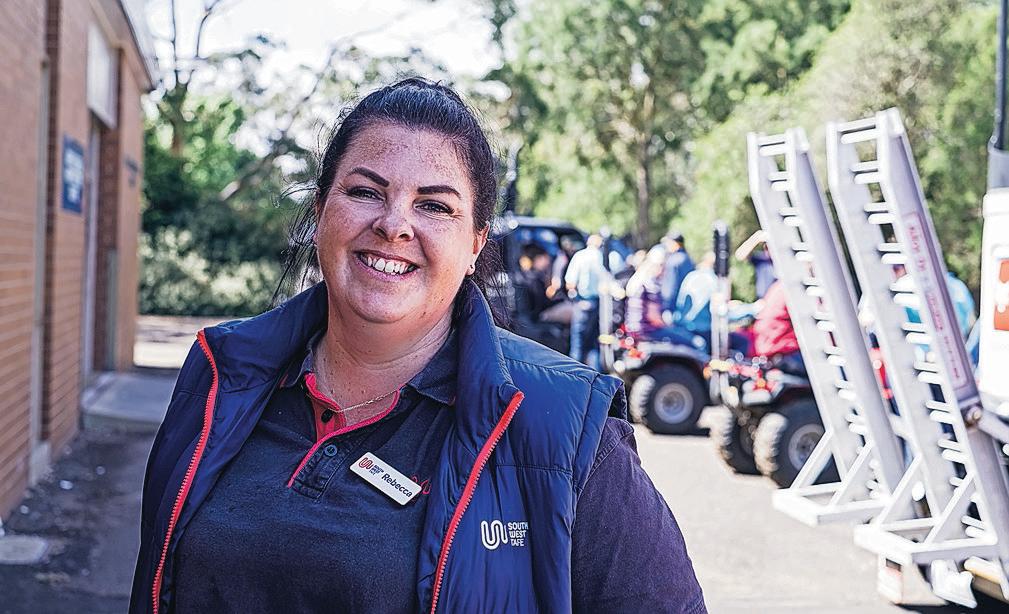
She says farmers should be willing to bring in new technology, move with the times and recognise the importance of training.
“It’s about working smarter, not harder. I think the dairy industry has a positive future — as long as we’ve got new blood coming up.”
Bec Toleman was named 2022 Teacher/Trainer of the Year at the Victorian Training Awards. Bec Toleman takes a birthing simulation cow to local schools to expose students to the possibility of careers in the dairy industry. Bec Toleman estimates she has milked on 50 to 60 south-west dairy farms.A NEW series of six podcasts will show how farmers in south-west Victoria are doing things differently and cutting costs.
Heytesbury District Landcare Network has recruited 30 farms to its Climate Resilient Farms Project, and now they want to tell other farmers about the amazing results they are achieving.
Understanding that farmers are busy people, to help spread the word HDLN has come up with the perfect solution — a series of six podcasts which can be listened to in the comfort of the tractor.
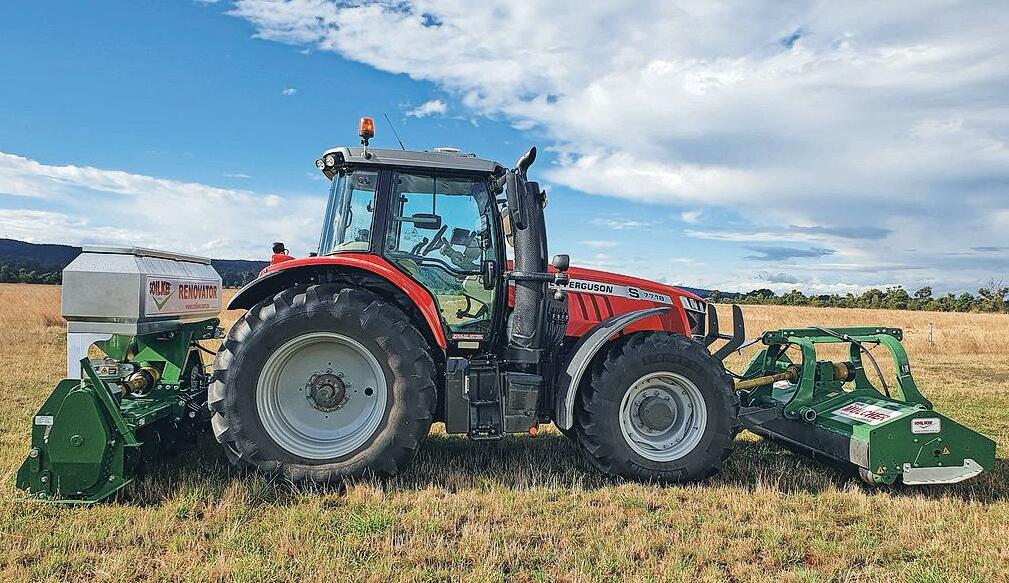
While modern technology takes care of the hay baling, farmers can find out how to gain a 25 per cent increase in dry matter yield in only a year and with no artificial inputs; why one farmer has gone from 10 to 50 worms in a shovelful of soil; how chooks could be a solution to red-legged earth mite on clover; how one little dung beetle can bury a single cow pad in just 48 hours; why planting shelter belts, chicory and plantain saves on vet bills; how to make the perfect pasture compost; what to put in your pasture mix to make paddocks more climate resilient; and how to make electric vehicles part of your farm.

The podcasts share the stories of six farmers.
Craig (Reggie) Davis, co-founder of Otway Pastures Milk, started composting his dairy farm waste more than 10 years ago and now produces 2000 tonnes of compost a year. As a result, he has cut his annual $150,000 fertiliser bill by more than half and his use of synthetic
fertiliser by 70 per cent. He’s now looking to mixed species pasture to cut artificial inputs even more.
Adam and Cath Jenkins of South Purrumbete stopped dairy farming in 2021 and haven’t used fertiliser for two years. Their land is now devoted to egg and beef farming with some dairy cow agistment and occasional holiday campers. The project’s agronomist, Jade Killoran, discusses the benefits of a diverse pasture mix.
On the family dairy farm in Cooriemungle, Gavin Sinclair is tackling soil health in a number of ways. Not only is he improving pasture
soil by including nine different plants in his grazing mix, he is employing creatures less than a centimetre long (one of which is technically the strongest animal in the world). Dung beetle expert Dr Bernard Doube discusses how dung beetles can rejuvenate soil and pasture.
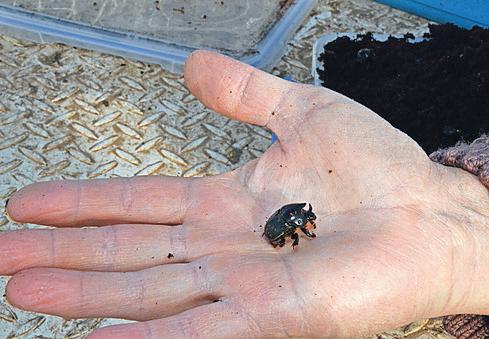
Bruce and Andrea Vallance are dairy farmers on the Great Ocean Road with a three-way cross dairy herd — Friesian, Aussie Reds and Montbeliardes. They discuss hybrid vigour, how they have cut their dairy energy bill by nearly 25 per cent, the astonishing results of their mixed species pasture trials, the success
of the Soilkee Renovator and Andrea’s role in the Timboon Agricultural Project.
Andrew Irvine runs a beef farm near Peterborough and has been restoring wetlands, fencing off bush and trialling mixed species pasture. He has already noticed that the cattle which graze on chicory have less worms and cocksfoot beats rye-grass for sandy soils.
Chris Hibburt and Katy Millard fatten male dairy calves for beef at their farm near Port Campbell. Chris, an experienced vet, talks candidly about the diminishing market for animal products, synthetic milk and off-grid electric car charging, while community-minded Katy discusses her climate change conscious children, one of whom is vegan and wants to live life car-free.
Hear the podcasts at: https://www.heytesburylandcare.org.au/podcast


delivers systemic NPK & Trace Elements economically!
Bio-Boost NPK Foliage Spray is high in energy, with premium levels of Phosphorous, Nitrogen, Potassium and trace elements for good pasture or crop nutrition. Within seconds of application the spray starts to work systemically, helping to correct deficiencies and improve the health of pasture. Reduces the need for supplements, helps with weight gain and productivity.
Bio-Boost Cal/Mag is specially formulated for low Calcium/Magnesium soils to increase leaf size and productivity. Using a highly soluble source of calcium like Cal/Mag 5:1 can quickly remove harmful sodium salts from the root zone, establish valuable calcium, magnesium and nitrogen levels, provide proper nutrition for rapid recovery and vegetative regrowth.
Most farmers treat their effluent pond like s*** Dealing with effluent is a pain for most farmers. It's an expensive for what can be seen as a low-grade fertiliser. And so, many farmers simply dump it on to pasture without strategic foresight. Can effluent be turned into a high-grade fertiliser?
An excellent natural agent for fast pasture recovery
Bio-Boost NPK Foliage Spray travels right to the roots to compensate soil ‘lock-up’ and deficiencies in pasture and crops.
From our point of view, absolutely!
And without the problems associated with bad bacteria - like blocked pump nozzles, unpleasant odour, low nutrient content, and run-off. How do you beat bad bacteria?
Call 1800 809 229 for more info or visit gfssolutions.com.au
Bio-Boost Cal/Mag is specially formulated for low Calcium/ Magnesium soils to increase leaf size and productivity. Using a highly soluble source of calcium like Cal/Mag 5:1 can quickly remove harmful sodium salts from the root zone, establish valuable calcium, magnesium and nitrogen levels, provide proper nutrition for rapid recovery and vegetative regrowth.
An excellent natural agent for fast pasture recovery.
Bio-Boost delivers systemic NPK & Trace Elements economically! is specially formulated for low Calcium/Magnesium soils to increase leaf size and productivity. Using a highly soluble source of calcium like Cal/Mag 5:1 can quickly remove harmful sodium salts from the root zone, establish valuable calcium, magnesium and nitrogen levels, provide proper nutrition for rapid recovery and vegetative
Simple - just add some special counteractive bacteria and oxygen the effluent pond and watch your problem become an asset. Enter Bio-Force - How to save on fertiliser!
is specially formulated for low Calcium/Magnesium soils to increase leaf size and productivity. Using a highly soluble source of calcium like Cal/Mag 5:1 can quickly remove harmful sodium salts from the root zone, establish valuable calcium, magnesium and nitrogen levels, provide proper nutrition for rapid recovery and vegetative regrowth.
An excellent natural agent for fast pasture recovery
Bio-Boost delivers systemic NPK & Trace Elements economically

Bio-Boost NPK Foliage Spray is high in energy, with premium levels of Phosphorous, Nitrogen, Potassium and trace elements for good pasture or crop nutrition. Within seconds of application the spray starts to work systemically, helping to correct deficiencies and improve the health of pasture. Reduces the need for supplements, helps with weight gain and productivity.
Bio-Boost NPK Foliage Spray is high in energy, with premium levels of Phosphorous, Nitrogen, Potassium and trace elements for good pasture or crop nutrition. Within seconds of application the spray starts to work systemically, helping to correct deficiencies and improve the health of pasture. Reduces the need for supplements, helps with weight gain and productivity.
!

Bio-Boost Cal/Mag is specially formulated for low Calcium/Magnesium soils to increase leaf size and productivity. Using a highly soluble source of calcium like Cal/Mag 5:1 can quickly remove harmful sodium salts from the root zone, establish valuable calcium, magnesium and nitrogen levels, provide proper nutrition for rapid recovery and vegetative regrowth.
Bio-Boost NPK Foliage Spray travels right to the roots to compensate soil ‘lock-up’ and deficiencies in pasture and crops.
Call 1800 809 229 for more info or visit gfssolutions.com.au
An excellent natural agent for fast pasture recovery
Aerobic bacteria can change the state of your pond by breaking the solids and fibre content of the effluent. This can represent a fertiliser saving, particularly for dairy farms. How much N.P.K. do in every year to spread on your pasture? Now imagine if you could your own for next to nothing!
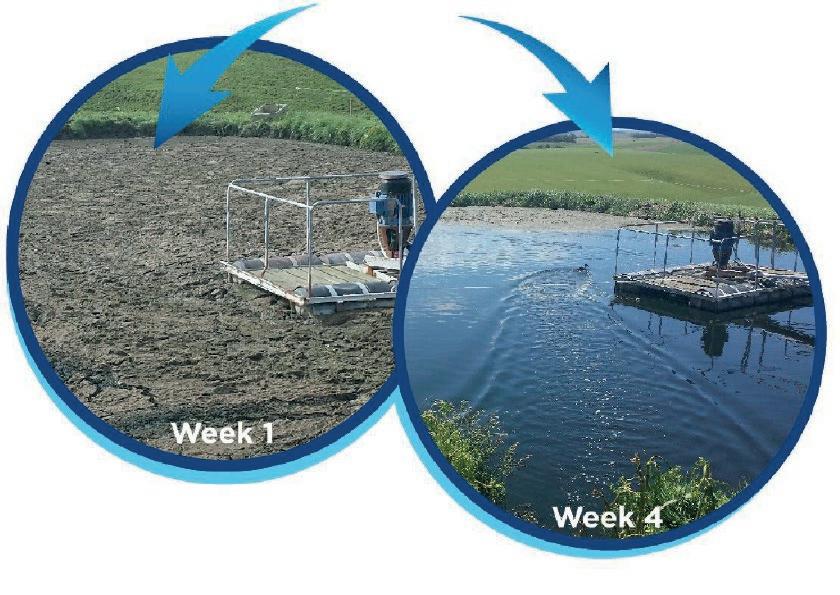
Bio-Boost NPK Foliage Spray is high in energy, with premium levels of Phosphorous, Nitrogen, Potassium and trace elements for good pasture or crop nutrition. Within seconds of application the spray starts to work systemically, helping to correct deficiencies and improve the health of pasture.
Reduces the need for supplements, helps with weight gain and productivity.
Bio-Boost NPK Foliage Spray travels right to the roots to compensate soil ‘lock-up’ and deficiencies in pasture and crops.
FREE Info pack!

Bio-Boost NPK Foliage Spray travels right to the roots to compensate soil ‘lock-up’ and deficiencies in pasture and crops.
Reduces the need for supplements, helps with weight gain and productivity.
An excellent natural agent for fast pasture recovery
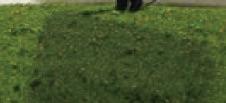
Call 1800 809 229 for more info or visit gfssolutions.com.au
Bio-Boost NPK Foliage Spray is high with premium levels of Phosphorous, Potassium and trace elements for good crop nutrition. Within seconds of application spray starts to work systemically, helping deficiencies and improve the health Reduces the need for supplements, weight gain and productivity.
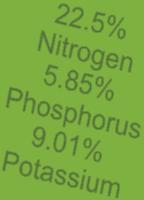
Bio-Boost NPK Foliage Spray travels roots to compensate soil ‘lock-up’ and in pasture and crops.
Bio-Boost NPK Foliage Spray travels right to the roots to compensate soil ‘lock-up’ and deficiencies in pasture and crops.
Call 1800 809 229 for more info or visit gfssolutions.com.au
Call 1800 809 229 now, or just send a blank email to: sales@biosystemsaustralia.com.au with "BioForce info" in subject line. (We respect your email privacy)
Call 1800 809 229 for more info or visit gfssolutions.com.au
 Hear about the dung beetle’s mighty value to pastures from the Heytesbury District Landcare Network’s podcast series
Hear about the dung beetle’s mighty value to pastures from the Heytesbury District Landcare Network’s podcast series
DAIRY FARMERS need to not only consider what their cows eat but how they process it, according to a visiting forage nutritionist.
Animal nutritionist Dr Glenn Judson, from Agricom in New Zealand, told a series of DLF Seeds innovation field days at Leigh Creek that processing speed can be as important as quality when it comes to feeding cows.
“You can have forages that have a similar amount of fibre but it’s all about making it easier for cows to digest what they eat, and reducing the amount of ‘sawdust’ they eat and that they can’t digest,” Dr Judson said.
The field days included a display of DLF Seeds’ new products and innovations and presentations by Dr Judson about their impacts on animal production and health.
“It’s about understanding how our forages change in terms of quality as they move into
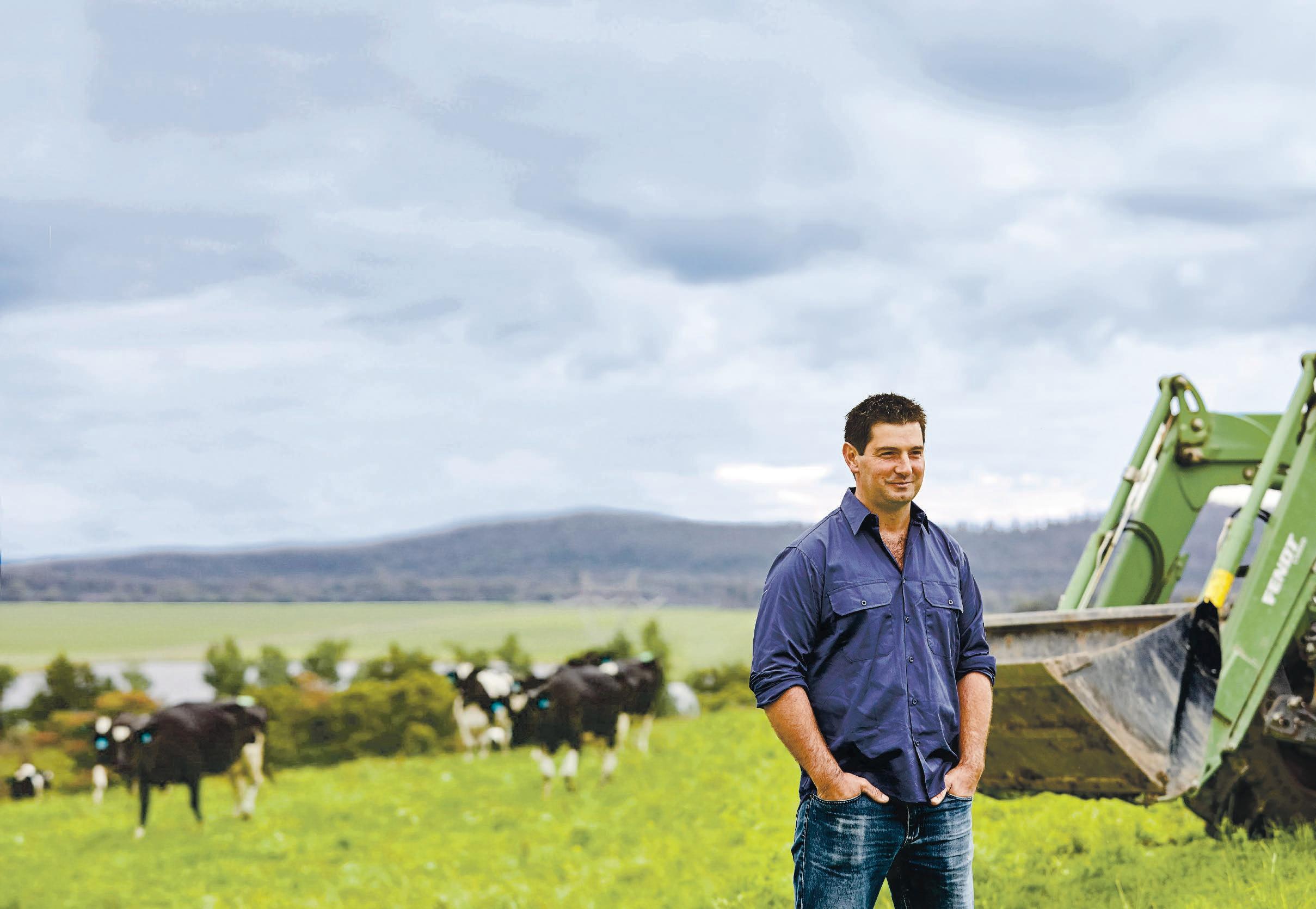
a day depending on dry matter — for it to be highly productive,” Dr Judson said.
“Some of the things we do make it incredibly difficult for those animals to consume that amount.”
The presentations, which were held over three days for farmers and agronomists from different companies, started with a tent-based discussion about what constitutes high-quality forage, particularly the amount of non-digestible material largely labelled as acid detergent fibre (ADF).
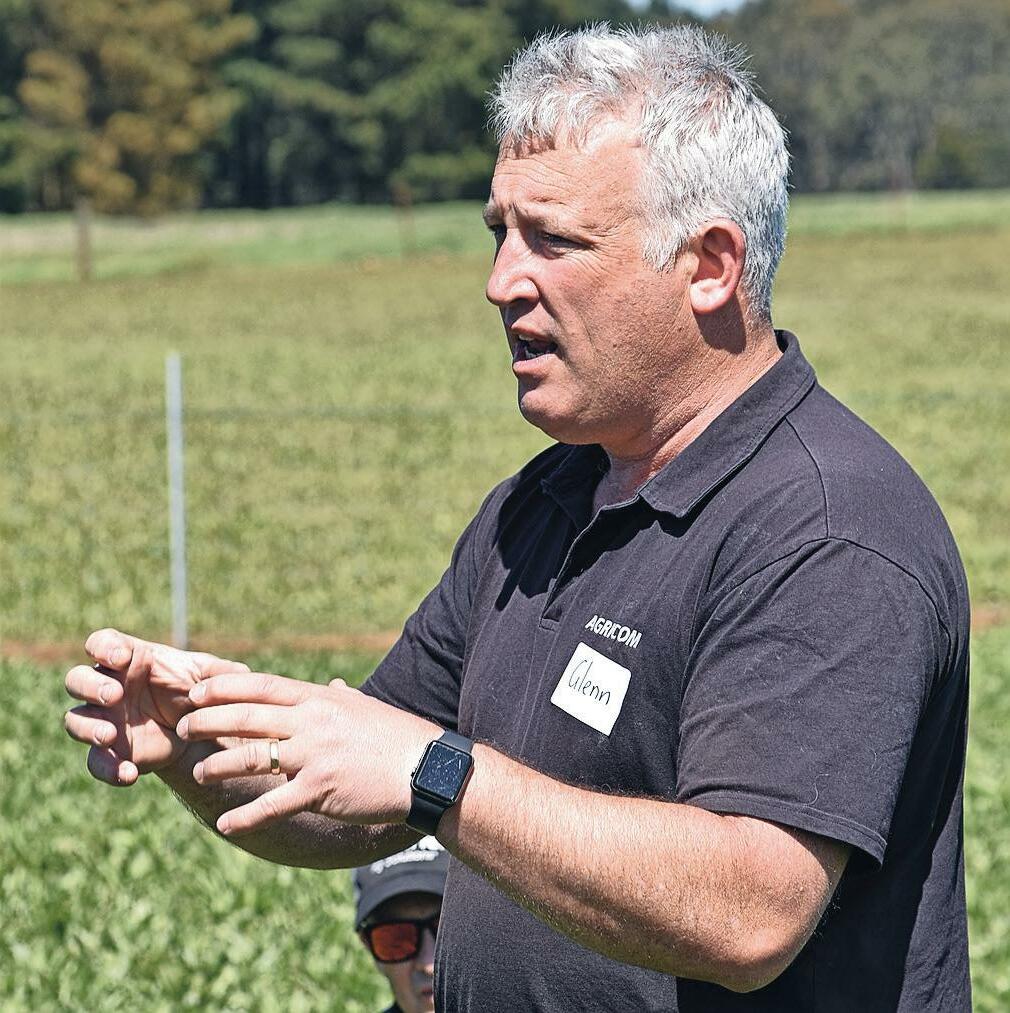
“That is highly correlated to digestibility and therefore the energy value of their feed,” Dr Judson said.
“The more sawdust we’ve got there, the lower the quality, the lower the digestibility and the lower the energy we get out of it.
“We need to reduce the level of undigestible stuff and build protein and water-soluble carbohydrates and plant sugars.”
Another important aspect of the digestion
Dr Judson said all forage products would flower at some stage and change in quality.
“The new innovations on display at the DLF field days are about shortening the period of time when those grasses, clovers or herbs have that poor quality material.
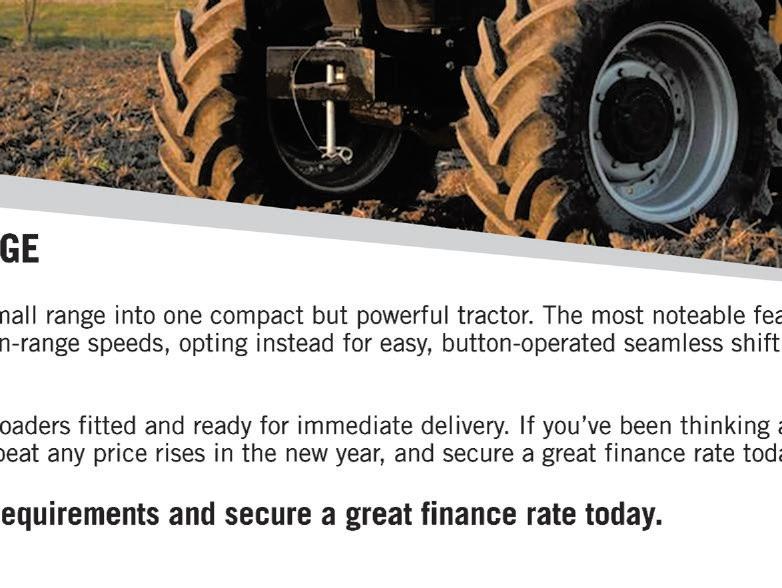
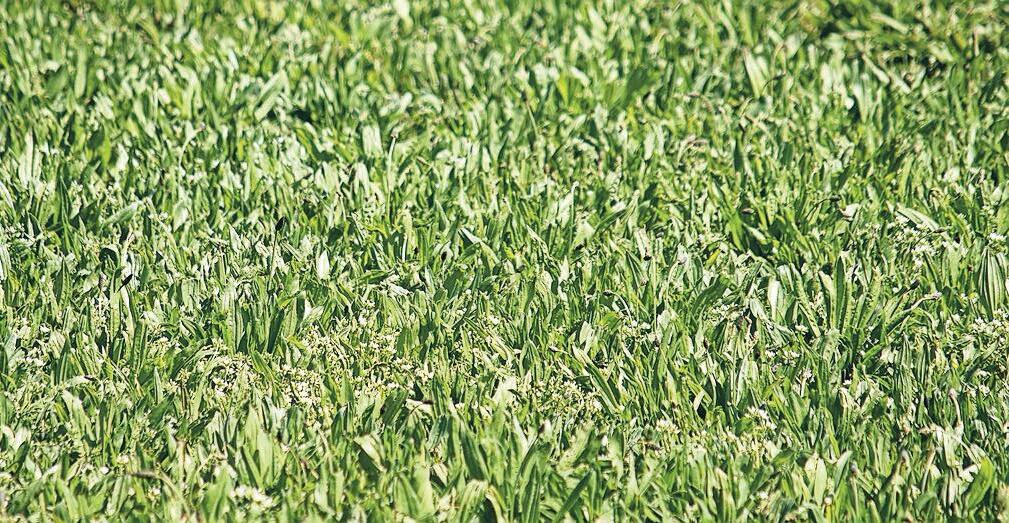

“We know they have to do it but the innovation is the later flowering, we’re not putting the seed head up early in the season.
“The term low ‘aftermath heading’ is around letting the plant produce a reproductive stem once for breeding but don’t continually throw up seed heads through the summer.
“We try to narrow the window in which our pasture plants have lower quality so animals have more time grazing good quality forages with less sawdust.”
Field day participants were told one product that could become increasingly important in Australia is Ecotain Environmental Plantain, because it lends itself to high intake, fast processing speed and holds up quality in the diet while serving an environmental
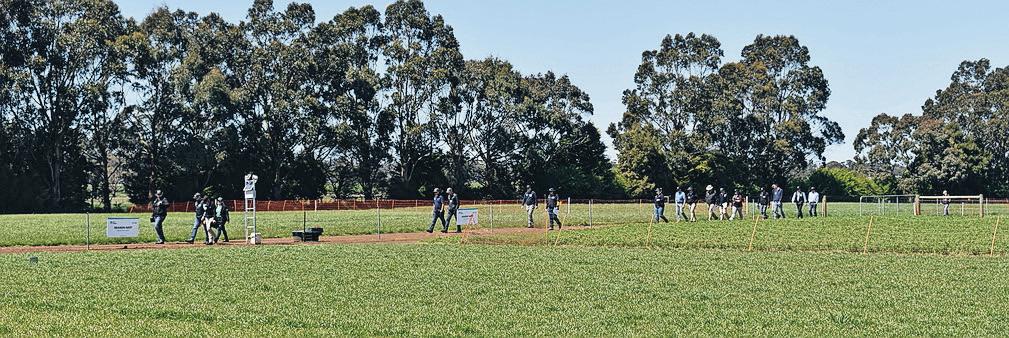
functionality in reducing nitrate leaching from urine patches.
“It’s useful for agronomists to understand there are some forage tools that have been well researched in New Zealand that could be used for similar application in Australia,” Dr Judson said.

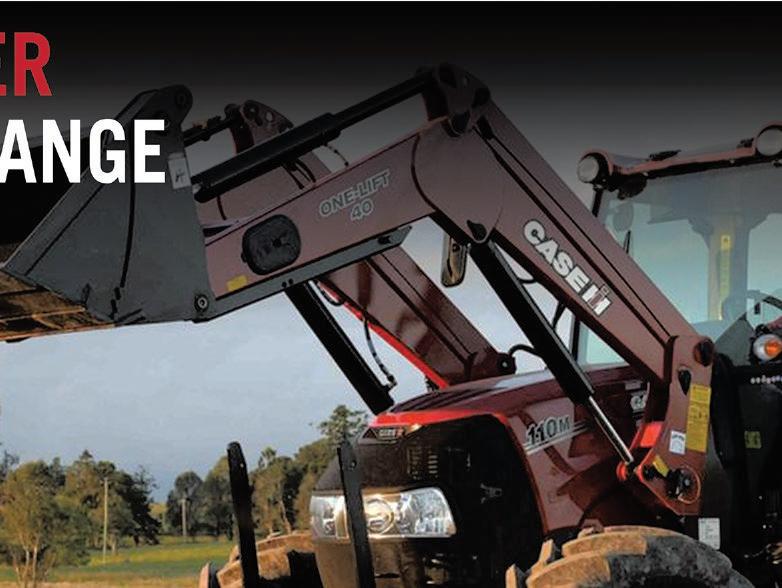
“We see the results of poor-quality feed at the vat every day. The dairy cow has the largest appetite and therefore we need to pay attention to what she eats.
“In terms of milk production, we need to be offering them as high-quality feed as we possibly can.”
Dr Judson said the same principles could apply across the Tasman.
“We have different systems and this shouldn’t be seen as a Kiwi coming over and saying you’re doing it all wrong,” he said.
“While the systems are similar, Australia has unique environments, for instance the summer heat and the patterns of growth can be quite different, but the same principles are universal and can be applied in the Australian context.

“Agronomists can deliver the information about how these forages can work in a way that is appropriate for Australian systems.”

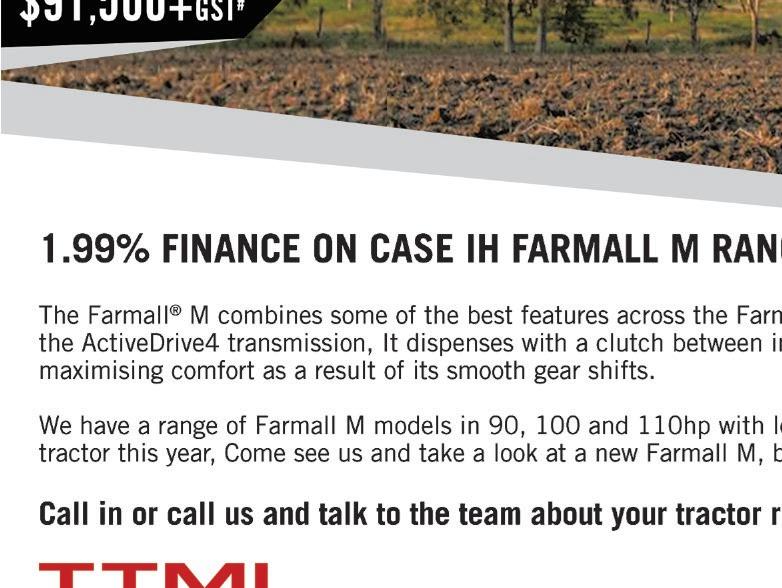
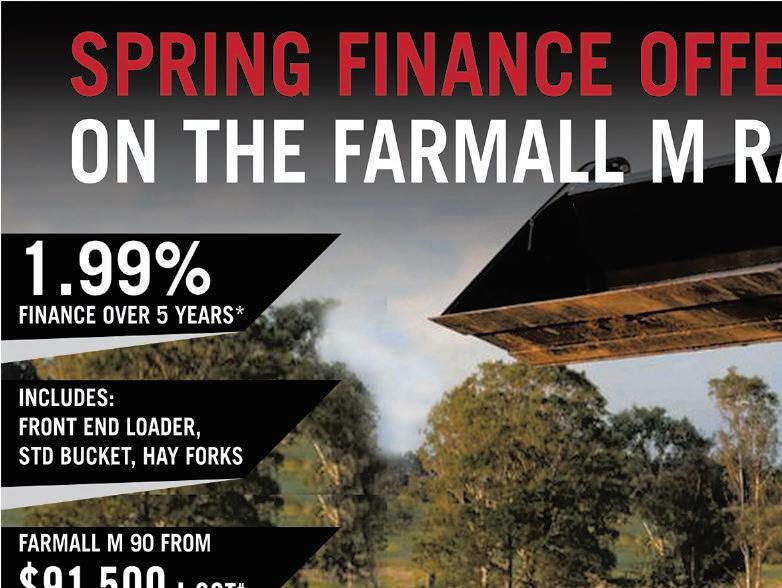
“The key message is around understanding how animals graze and how we can help them to reach the high intakes they require to be highly productive.”Animal nutritionist Dr Glenn Judson uses a blender display to illustrate the differences between high and low-quality forage. The DLF Seeds innovation field day at Leigh Creek near Ballarat included field displays of new products and different plots.
As life speeds up, our time is becoming increasingly valuable. Whether it is being able to have breakfast at the table in the morning before the kids head off to school or saving time on finding/ hiring/rostering milkers, you cannot replace time – but we can help you save it.
Lely have been at the forefront of agricultural innovation since 1948, with the sole goal of making life easier and working together for a sustainable, profitable, and enjoyable future in the agricultural sector. With over 1600 employees, established customers in over 45 counties and 1,600 current patents protecting their inventions, they are the market leaders in agricultural robotic technology.
Robotics is what Lely are passionate about, and that is what they do - for more than 70 years. Innovation is what we are passionate about and is what we do – making us the perfect partnership.

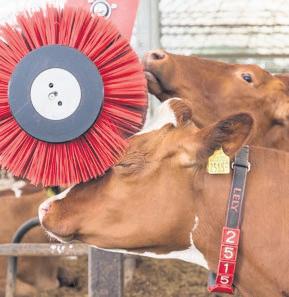
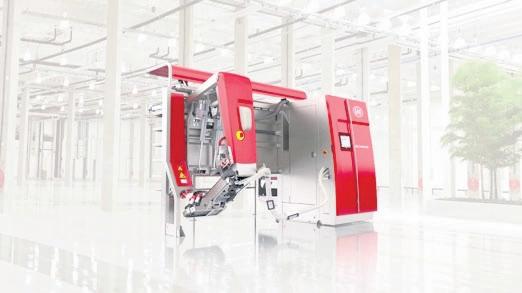
We are starting to see some steady traction in Australia, with both corporate clients and family farms choosing robotic technology over traditional milking dairies for staffing solutions (not requiring milkers, opening a labour unit to spend time on other areas of the farm), and the lifestyle (not having to be home morning and evening in the dairy to milk).
There are over 100 Lely Astronauts (milking robots) in Australia, and 14 in SW Victoria, working effectively on grazing farms. This includes the largest Lely grazing farm in the world, installed in June 2019 by our Southwest Dairy Services technicians in Simpson, Victoria.
To discuss how robots can work for you, contact us today.
